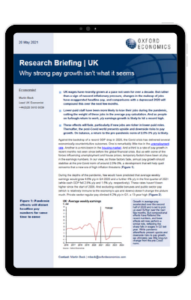UK | Why strong pay growth isn’t what it seems

UK wages have recently grown at a pace not seen for over a decade. But rather than a sign of nascent inflationary pressure, changes in the makeup of jobs have exaggerated headline pay, and comparisons with a depressed 2020 will compound this over the next few months.
Lower-paid staff have been more likely to lose their jobs during the pandemic, cutting the weight of these jobs in the average pay calculation. And as people on furlough return to work, y/y earnings growth is likely to hit a record high.
What you will learn about:
- Pandemic effects will distort headline pay numbers for some time to come
- The post-Covid world presents upside and downside risks to pay growth.
- The post-Covid world could see some slight reversal of the power imbalance between employers and their employees
Tags:
Related Services

Post
US Rolls Up Welcome Mat for International Travel
Research Briefing UK | Why strong pay growth isn’t what it seems Trump tariffs set to raise effective rate above 1930s levels.
Find Out More
Post
Initial takeaways from Trump’s ‘Liberation Day’ announcement
In two or three years' time, US imports could fall by around 15% due to discounted reciprocal tariff hikes.
Find Out More